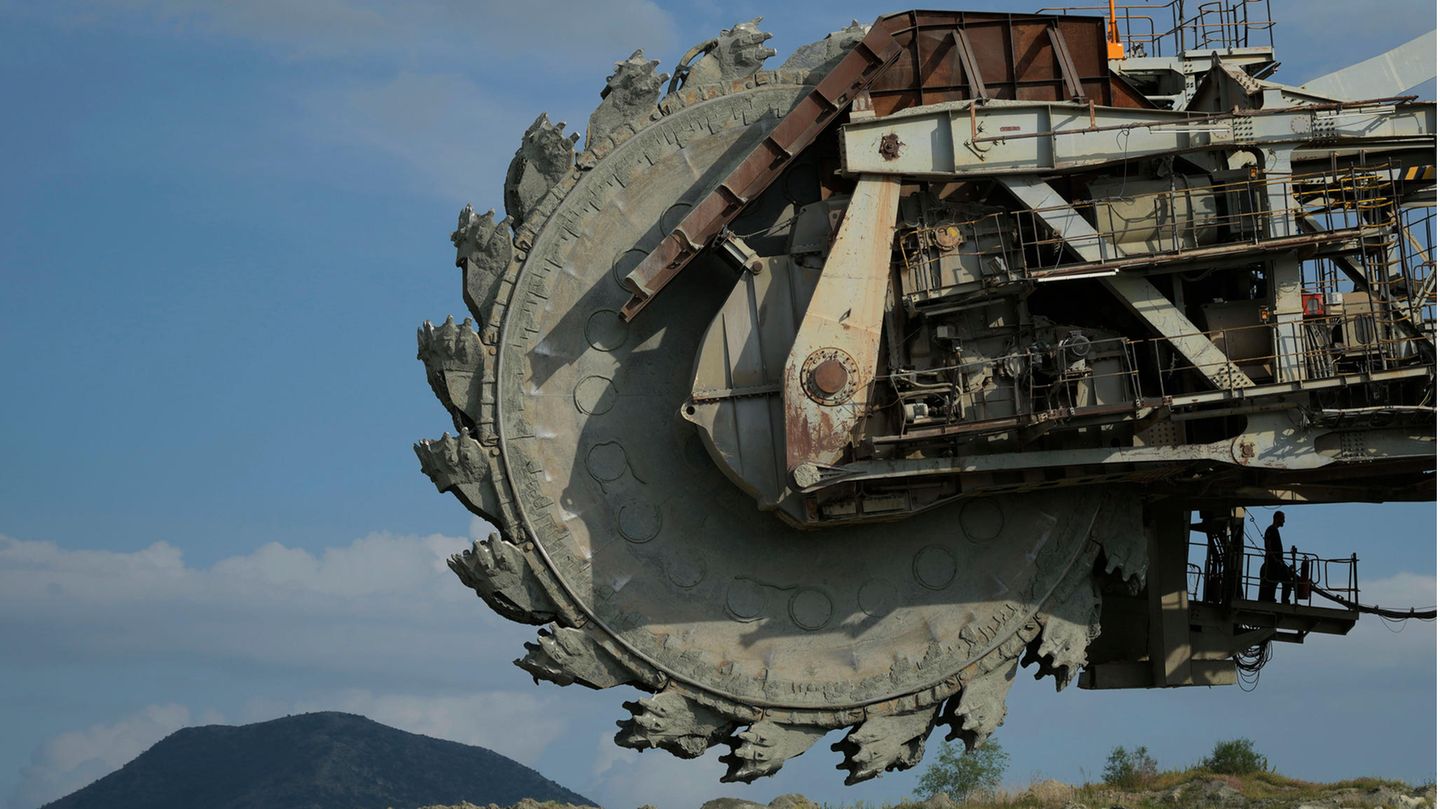The majority of Germans like it. Since Russia is turning off the gas tap, the federal government is back to coal despite the decision to phase out. And the TüV brings nuclear power back into the conversation. So it is with the energy supply.
The phase-out of coal has been decided, and the phase-out of nuclear power is almost complete. But the Ukraine war is also torpedoing the energy transition towards more climate-friendly energy production. Russia is increasingly drying up gas flows to the West. The Green Economics and Climate Minister Robert Habeck is therefore forced to act against his convictions and, in view of the looming emergency, to back the climate-damaging coal-fired power generation to secure the energy supply. This does not apply to the three German nuclear power plants that are still in operation. According to a TüV report, an extended term now seems possible.
Since the expansion of renewable energy sources has not been sufficiently advanced in recent years, it is now necessary to save “the rare commodity gas” (Habeck) in view of the situation in order to be able to ensure the energy supply in winter. How can coal or nuclear power help? What about the energy supply?
How was the coal situation before the Ukraine war?
Coal is the most important energy source in the power supply worldwide – but also the dirtiest. In the European Union, which wants to become climate-neutral by 2050, coal-fired power generation has recently been reduced; Germany decided to phase out coal in 2020. At the beginning of the year, according to the US organization Global Energy Monitor, 202 coal-fired power plants with a capacity of 111 gigawatt hours were still connected to the grid in the EU – most of them, 63, in Germany. In 2020, however, coal-fired power in the EU accounted for just under 13 percent of electricity production. This is also due to the rising prices for CO2 certificates as part of European emissions trading.
“Since 2015, all European countries have gradually agreed to phase out coal-fired power generation,” says Nicolas Berghamns from the Paris Institute for Sustainable Development and International Relations. Even Poland, which relies heavily on coal-fired power generation, made corresponding commitments. In contrast to other regions, such as Asia, there are no plans for new coal-fired power plants in the EU either. Individual countries, including Portugal, are already no longer using coal to generate electricity.
What will the Ukraine war change?
The curtailed Russian gas deliveries are threatening the supply situation – in order to save gas, several European countries have announced that they will be generating more coal again in the short term. In Germany, individual coal-fired power plants are to run longer, this is to be limited to the end of March 2024. However, the federal government emphasizes that the early coal phase-out in 2030 will not be shaken. However, increased coal-fired power generation is already a reality: According to the analysis company Rystad Energy, coal-fired power generation in Germany increased by 20 percent in the first five months of the year. Austria, Italy and the Netherlands also want to burn more coal again.
Europe itself has lignite in particular – this is also particularly harmful to the environment in comparison to hard coal. Since Russian coal can no longer be imported into the EU from August, other suppliers have to be found. However, according to the Association of Coal Importers (VDKI), Russian coal imports could quickly be replaced by supplies from countries such as Colombia, South Africa, Australia, Mozambique and Indonesia.
What role can nuclear power still play?
In contrast to coal, Germany is taking a different path from its European neighbors with the decision to phase out nuclear power eleven years ago. The decision was triggered by the nuclear disaster at the Japanese nuclear power plant in Fukushima on March 11, 2011. In addition to fundamental safety concerns, unresolved questions about the disposal of the nuclear waste that has been radiating for generations speak against nuclear power generation. The last three nuclear power plants still in operation in Germany are scheduled to go out of service in December. According to experts, an extension of the term beyond December, which was discussed in view of the emergency, is not justifiable for safety reasons and because new fuel rods are difficult to obtain. This is also the attitude of the federal government, with the FDP showing itself open to a debate.
On Friday, TÜV Süd presented an expert opinion on behalf of the Bavarian state government, according to which it had no safety concerns about continued operation of the Isar 2 nuclear power plant beyond the end of the year. A restart of Block C in Gundremmingen is “possible from a technical point of view,” it says. The letter dates from April 14, but has only now become known and is available from the German Press Agency (DPA). The TÜV experts assume that continued operation or the resumption of operation would be possible for a few months with the existing fuel elements. They see potential for Isar 2 to produce an additional 5,160 gigawatt hours of electricity by August 2023. In Gundremmingen it is “plausible” to put together a reactor core with existing fuel elements that could run for about 6 months and generate 4900 gigawatt hours of electricity. This corresponds to around 2.4 percent of the electricity consumed in Germany in 2021. According to TÜV Süd, it would even be possible to reorder fuel elements for Isar 2 within 12 months – that would be in good time before the end of the electricity production estimated as possible by the end of August 2023.
In response to the TÜV study, the Federal Ministry for the Environment and the Federal Ministry for Economic Affairs once again made it clear that the points mentioned had already been taken into consideration. “Stretched operation” of the nuclear power stations is possible for 80 days. However, this is associated with a reduction in output during regular operation, i.e. less electricity is produced in summer, so that the bottom line is that electricity is only generated slightly longer, but not more. The effect on the energy supply is therefore minimal and bears no relation to the existing safety concerns and the necessary changes in the law. New security checks would also take too long. As a result, the reactors would no longer be available this year and would therefore not be able to generate electricity in the short term.
What role do renewables play?
The crisis also harbors an opportunity: the EU has repeatedly called for using the energy crisis to invest more in renewables instead of going back to fossil fuels. The increased coal-fired power generation would lead to a short-term increase in emissions, says energy expert Berghamns. “But the advantage of using these power plants is that there will be no investment in new capacity.” This is what differentiates Europe from Asia: New coal-fired power plants are still being built there and are expected to remain in operation for decades to come.
A plan called RepowerEU is currently being discussed in the EU, with which investment in renewables should be increased and overall energy consumption reduced. According to Berghamns, implementing this plan could allow Europe to “turn the corner” and achieve its own climate goals.
According to the International Energy Agency (IEA), there is at least some leeway in the EU to temporarily switch to coal without driving up emissions. According to calculations by the organization, around 14 percent of Russian gas imports could be replaced by coal-fired power generation without additional greenhouse gas emissions.
Majority of Germans for coal and nuclear use
In view of the high energy prices and the problems with gas imports from Russia, the majority of Germans are in favor of greater use of coal and nuclear power. In the ARD “Deutschlandtrend” on Thursday, 56 percent of the participants stated that they were in favor of using coal-fired power plants more. There was a majority for this position among people over 50, but not among younger people. 61 percent of the survey participants support the continued operation of the German nuclear power plants beyond the previous phase-out date at the end of this year. Among men, 67 percent were in favor of it, among women only 55 percent.
Source used: Communication from the Federal Ministry for the Environment, Nature Conservation, Nuclear Safety and Consumer Protection
Source: Stern
David William is a talented author who has made a name for himself in the world of writing. He is a professional author who writes on a wide range of topics, from general interest to opinion news. David is currently working as a writer at 24 hours worlds where he brings his unique perspective and in-depth research to his articles, making them both informative and engaging.




